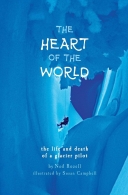Heart of the World: The Life and Death of a Glacier Pilot
- Author: Rozell, Ned
- Publisher: Ned Rozell (2019)
- Book
- Literary Category: Biography & Autobiography
- Pages: 196
- Cover Type: S - Softcover
- Dimensions: 5.250" x 8.000" x 0.400"
- Weight: 8.0oz
- ISBN-10: 1-73394-820-1
- ISBN-13: 978-1-73394-820-3
| SRP: | $20.00 | |||||
| Lowest Cost: | $12.00 | |||||
| Quantity: | 24 | 4 | 1 | 0 | 0 | 0 |
| Discount | 40 | 35 | 0 | 0 | 0 | 0 |
Nothing rattled Keith Echelmeyer. Come back from rappelling into blue glaciers in Antarctica, teach a university class the next day. Crawl out from a plane crash with a broken leg, head to Greenland in a cast the next week. Bag an iconic Alaska peak for a first winter ascent over the weekend, stroll into work on Monday. He flew his single-engine plane like most of us drive cars. The mileage of his glacier flights equalled a few trips around the world. But May was a bit much, even for one of the world's most capable experts in the emerging field of climate studies. Finals, proposals, shuttling people and gear back and forth to Black Rapids Glacier, writing the Most Important Paper, the one that showed the rapid melt of Alaska's glaciers, which contained enough water to raise the world's seas 20 feet. His right hand. It wasn't helping. Dropping that wrench on the glacier? The numbness that made him clench, unclench. Flying had always been meditation. He flew by thinking of flying. Now, those times he needed to look down. Is my hand on the stick? One day amid the madness, he flew his Piper over blue-white icefields. Clear and calm, his best day of flying ever. Crossing all of Alaska, he landed in Yakutat, a fishing village surrounded by glaciers. He was hosting a conference there. That evening at a lodge, Echelmeyer's mighty body convulsed with spasms. At the top of his professional and personal arc, Echelmeyer learned of his brain tumor. No longer would he fly over glaciers, comparing their heights year after year to unravel one of the first compelling stories of change. He was, suddenly, no longer the physics genius, the fearless mountaineer, the man with maps in his head. Doctors gave Echelmeyer six months to live. He needed to finish his Science paper, and so much more.In that precious time he had left, Echelmeyer pulled on his climbing helmet and leaned on ski poles to check the mail. With help from friends, he hiked on two-week backpacking trips in the Brooks Range, until his legs no longer worked. Echelmeyer got his paper published. Reporters all over the world picked up the story of Alaska's glaciers adding as much to the sea as Antarctica's and twice as much as Greenland's. It was something he knew by intuition and proved with his small red airplane. Echelmeyer lived and died well. And he handled the transition as well as anyone ever will. I worked with him through my job as a science writer at the University of Alaska. He intimidated me with his skills, knowledge and bravado before he was sick. He hugged me every time he saw me after he became sick. He and his wife drew a road map for how to handle a day that changes everything and what comes after.

